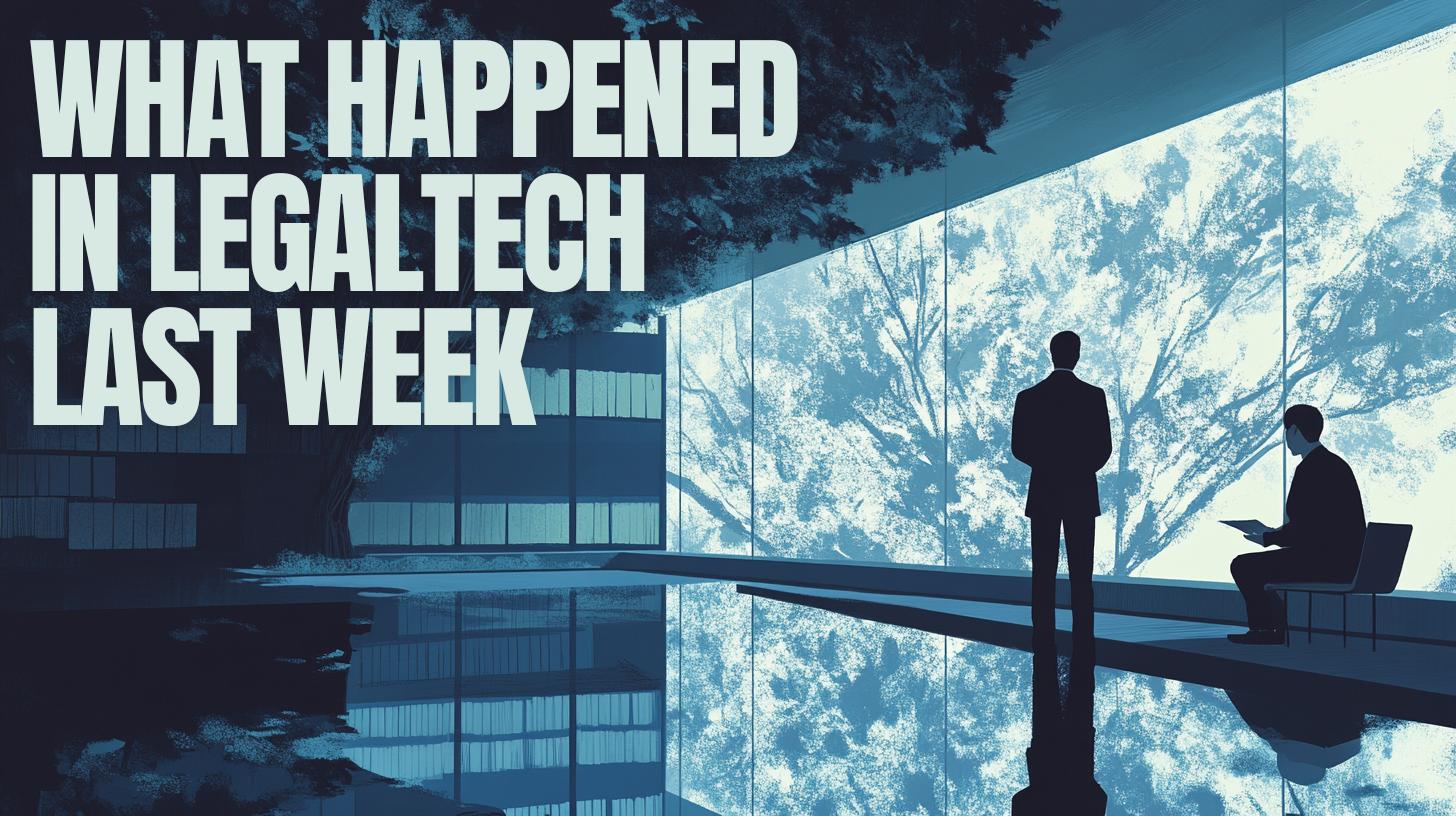FL #91: ILTACON 2024 Recap - Practical Innovation Takes Center Stage

ILTACON 2024 recap
I'm fast approaching double-digit appearances at ILTACON (this was the 9th), and this way may be the best one so far.
ILTACON 2024 transformed Nashville into the epicenter of legal technology, drawing an impressive crowd of over 4,200 registrants from 34 countries. With 1,882 full-week attendees immersing themselves in 84 educational sessions featuring 336 speakers and 211 exhibitors showcasing their latest innovations, the energy was palpable throughout the event.
As I navigated the bustling vendor hall and engaged in hundreds of conversations, it became clear that while the excitement around new technologies remains high, there's a notable shift towards practical, value-driven implementation.
Key Themes: A Year-on-Year Comparison
2023: The AI Hype Train
Last year, we witnessed an explosion of AI-related announcements. Vendors scrambled to integrate AI into their offerings, often prioritizing novelty over practical application. The legaltech community was abuzz with both excitement and apprehension about AI's potential to revolutionize the industry.
2024: Measured Progress and Practical Applications
This year, the conversation has matured significantly. The industry has moved from speculative excitement to a more nuanced, pragmatic approach. Firms are now asking not just "Can we use AI?" but "How can GenAI solve our specific challenges?" This shift is reflected in more targeted implementations, a focus on governance, and a growing emphasis on measurable outcomes.
Three Key Trends Shaping Legal Tech
- GenAI: From Hype to Pragmatism
- The focus has shifted from "we need a GenAI tool" to solving specific problems.
- There is less chasing of hype, though an expectation gap still exists.
- Most vendors seem more selective about AI integration, focusing on genuine value-add.
- Governance, Integration, and Use Cases
- Emphasis on responsible implementation - this is true of foundational tech and GenAI tools.
- Integrating new tools and existing systems (think DMS, PMS, Teams, etc. ) was highlighted as a move towards a need rather than convenience.
- Priority should be placed on addressing identified problems rather than on exploratory implementation.
- Cloud Adoption: The Journey Continues
- Firms are still managing migrating from on-prem to cloud-based systems and wrangling with adoption.
- "Time recording" systems lead planned cloud migrations.
- Practice Management Systems (PMS) show the least cloud adoption.
Insights from the G100/200 Session
The G100/200 session provided a comprehensive overview of how larger firms approach AI and other emerging technologies. The sentiment was cautiously optimistic, as summoned up nicely with:
"While we are not 'whoop whooping' we are not 'poop pooping' GenAI either."
Key takeaways from this session align closely with the trends above:
- Pragmatic AI Adoption: Firms are moving beyond the initial excitement to focus on practical applications. There's a growing recognition that AI is not a one-size-fits-all solution but a tool to be applied judiciously to specific challenges.
- Integration Challenges: A major focus is on integrating tools with existing systems, particularly document management systems (DMS) and practice management systems (PMS). This aligns with the broader trend of prioritizing integration and governance, particularly in AI implementations.
- Cloud Migration Continues: Surprisingly, cloud adoption remains a significant topic of discussion. Firms are at various stages of migration, with time recording systems leading the charge and PMS lagging. This reflects the ongoing journey towards modernizing legal tech infrastructure.
- Expectation Management: There's an acknowledgment of an "expectation gap" between what AI can currently deliver and what some may hope it can do. Firms are working to educate stakeholders and set realistic goals for AI initiatives.
- Focus on Use Cases: Rather than implementing tools broadly, firms are identifying specific, high-value use cases where AI can deliver tangible benefits. This approach helps demonstrate ROI and builds confidence in AI technologies.
The session underscored the need for a strategic, measured approach to AI adoption, echoing the broader shift we're seeing in the industry toward practical, value-driven innovation.
From Fringe to Mainstream: Technologies Coming of Age
It was refreshing to see many of the technologies and categories that were previously fringe tools for early adopters to be cemented as a mainstay or well on their way. Here are three broad categories which came up several times in discussions.
- Structure Diagrams
- Now a defined category with two key players - Jigsaw and Structure Flow.
- Firms actively procuring and expanding usage.
- We first covered this emerging technology in Fringe Legal back in 2021, highlighting its potential to revolutionize how legal professionals visualize and analyze complex corporate structures. Read the original report here.
- Work Allocation and Capacity Management
- This category has seen significant growth, driven by the challenges of managing hybrid work models.
- Solutions in this space address the critical need for efficient resource allocation and workload balancing in an increasingly flexible work environment.
- The rise of these tools reflects a broader trend toward data-driven decision-making in law firm management. This space includes large vendors and younger disruptors. Two years ago, I spoke with the co-founder of Capacityaddress, who provided a perspective on the problem to be solved.
- Task Management
- The focus has shifted to lawyer-centric solutions, moving beyond traditional Legal Project Management (LPM) tools designed for specialists.
- Key differentiators include seamless integration with firm systems (DMS, PMS, Copilot, etc.) to meet stringent information security requirements and meet users where they spend most of their time (Outlook, Teams, and Copilot)
- This evolution highlights the industry's recognition that technology must adapt to lawyers' workflows, not vice versa, to drive adoption and productivity.
The startup scene at ILTACON 2024 was dominated by AI-focused companies, with over 50% of startups in the hub primarily leveraging AI technologies. Notable focus areas included time & billing and related analytics, reflecting the ongoing push for greater efficiency and data-driven insights in law firm operations.
The end of this post includes a list of all startups, their descriptions, and their categories.
The Road Ahead: Challenges and Opportunities
As the legal tech landscape continues to evolve, firms face both significant challenges and exciting opportunities:
- Bridging the Expectation Gap: There's a growing realization that no single [GenAI] product will solve every problem perfectly. Firms must work to align expectations with realistic outcomes, focusing on specific, high-value use cases.
- Data Quality and Management: The effectiveness of AI and analytics tools hinges on the quality and accessibility of data. Firms must invest in robust data management strategies to fully leverage these technologies.
- Skill Development: Upskilling lawyers and staff to use new technologies effectively will be crucial. This goes beyond technical training to develop a continuous learning and adaptation mindset.
- Ethical AI Use: As AI becomes more prevalent, firms must navigate the ethical considerations of its use, particularly in areas like bias mitigation and client data protection. Something I didn't hear discussed much at the conference, but I know it is front of mind.
- Client-Centric Innovation: Successful firms will focus on innovations that directly enhance client value, whether through improved service delivery, more accurate pricing, or novel legal products.
- Balancing Innovation and Security: As cloud adoption continues and new technologies emerge, firms must balance innovation and maintaining robust security measures.
Two insights from Hannah Fry's keynote provide food for thought as I wrap up:
- Reflecting on the Challenger disaster, Fry noted that "the engineers didn't even imagine data the charts that needed to be created." Similarly, we may not yet know the questions to ask to uncover the right use cases. I remain open to unexpected insights and applications as we explore new technologies.
- Fry reminded us, quoting Daniel Kahneman, "When faced with a difficult question, we often answer an easier one instead, usually without noticing the substitution." For innovators, this cautions against oversimplifying complex challenges or rushing to implement the next shiny thing without fully understanding the problems we're trying to solve.
As always, I'm curious to learn your takeaways or insights. Did you spot any trends or technologies I missed? Reply to this email and let me know – I'd love to hear your thoughts!
Innovation and ROI

Lucara recovered an epic 2,492-carat diamond from its Karowe Diamond Mine in Botswana. What does that have to do with legal tech? There are lessons here for innovators.
You see, Lucara has somewhat of a track record for finding these mega-diamonds. In the last seven years, they have found three diamonds over 1,000 carats (the other two were 1,758 and 1,111, respectively) and over 300 diamonds over 100 carats. That is bonkers!
Here are three lessons I took away on evaluating the impact of technological investment on the outcome:
How can the tech make getting to the outcome better, faster, or cheaper?
Lucara's strategic investment in advanced X-Ray Transmission (XRT) technology has been pivotal in recovering record-breaking diamonds - especially intact at its mines. This cutting-edge sorting process enables Lucara to identify and preserve large, high-value stones, maximizing their value.
When reviewing technology, consider how it can streamline processes, improve accuracy, and reduce costs. Often, this isn't just from frontier tech (e.g., GenAI) but from foundational technologies that improve the overall process.
Can the tech help to improve margins or efficiency? Could it reduce value leakage or write-offs?
Lucara's use of XRT technology has reduced diamond breakage during processing, preserving the value of large stones and contributing to the company's position as a high-margin producer. The ability to recover exceptionally large diamonds intact, such as the 1,109-carat Lesedi La Rona and the 813-carat Constellation, is evidence of the efficiency gains from their innovative approach.
Law firms should consider how legal tech can boost margins and minimize write-offs. What tools can be put in place that reduce friction or juggling back-and-forth between applications that have a cost of disrupting the "flow state"? These can free up attorneys' time for higher-value work.
How can you become the leaders or pioneers of a specific approach? (Could this be through partnering with the technology leader in the space?)
Lucara has developed a reputation as an innovation leader in the diamond industry. Their pioneering use of XRT sorting, in close partnership with TOMRA, a leading provider of sensor-based solutions, has "forged a new gold standard approach that is now operating all around the world".
Certain firms can position themselves as trailblazers by partnering with technology that will become the staple of work tomorrow and collaborating with the leaders to maximize value ahead of their peers. This requires some appetite for risk as it may mean partnering with startups that will provide access to best-in-class tools and expertise. By being early adopters and sharing success stories, firms can showcase their innovative mindset and attract forward-thinking clients.

The legal tech landscape saw pivotal shifts with a strong focus on AI advancements and a tragic loss. Deloitte's spin-out of Moonlit emphasizes a growing trend toward specialized generative AI tools specifically tailored for EU legal research, highlighting the ongoing tech evolution within the profession.
Meanwhile, Thomson Reuters expanded its AI capabilities by acquiring Safe Sign Technologies, further embedding legal-specific large language models into their offerings to enhance precision and innovation in legal services.
The community is also mourning the loss of influential figures Mike Lynch and Christopher Morvillo, marking a significant moment of reflection for the industry.
Read or listen to the full brief, powered by LawTechDaily, for a summary of 31 stories.
🔗 In other news
These two thoughts have been stuck in my head this last week:
- Ambition thrives on honest feedback
"Average players want to be left alone; good players really want to be coached; and, great players want to be told the truth." - Nick Saban
- 4-part Roadmap for AI adoption from Ethan DeWaal
Ethan moved from being a SDR to AI GTM Product Manager at Asana by successfully leveraging AI for himself and his colleagues. He shared his 4-steps on how he thinks about AI adoption - start simple and build up:
- Chat with a prompt to get some answers quickly.
- Chat with a prompt and a vector database understand (RAG approach) to deal with higher volume of data and provide more refined answers.
- Add automation so maybe the chat out is automatically produced based on specific conditions. E.g. send the meeting transcript, extract key notes, and update the CRM.
- Bring a few automations together to build workflow, perhaps add a great user experience, and that where you have co-pilots.
Appendix:
Startups of ILTACON (those that presented that Startup Hub)
| Startup Name |
Description |
Category |
|---|---|---|
| Hotshot |
Hotshot empowers legal professionals with on-demand, video-based learning that makes mastering complex legal concepts and skills engaging and accessible. |
Legal Education |
| Sente Advisors |
Sente Advisors revolutionizes legal tech strategy with their "Innovation-as-a-Service," empowering firms to seamlessly scale innovation with expert guidance. |
Legal Consulting |
| Beagle |
Beagle makes eDiscovery cruelty-free by making review faster and more predictable. Worth a look for anyone who does document review at volume. |
eDiscovery |
| SessionGuardian |
SessionGuardian secures your legal operations with cutting-edge security solutions tailored specifically to protect sensitive legal data. |
Cybersecurity |
| Matteroom LLC |
MATTEROOM is a SaaS tailored for professional service industry allowing you to accelerate project intake, capture billable time and expense intelligently, and streamline your billing cycle. |
Billing |
| PointOne |
PointOne delivers game-changing AI insights that transform how law firms operate, enabling smarter, faster decisions. Hate timekeeping or prebill review? Check them out. |
Legal Analytics |
| LexPipe |
LexPipe delivers real-time legal intelligence about clients and matters from licensed commercial data sources directly into the systems attorneys and knowledge managers already use. |
Legal Research |
| Briefly |
Briefly supports law firms by managing back office operations so attorneys can spend more time providing value to their clients. |
Back Office Management |
| FiT |
FiT, "Future in Tech", is an information governance provider redefining retention and document lifecycle management. FiT offers an innovative and comprehensive software suite. |
Information Governance |
| Vable |
Vable is an information management platform that enables you to aggregate, filter, and deliver customized content to the people you support. |
Information Management |
| StreemView LLC |
StreemView is a common-sense, Early Case Assessment and investigative platform for reviewing data from cloud collaboration tools, such as Slack, Teams, etc and mobile devices, in the format they were originally presented. |
eDiscovery |
| Wemble |
Wemble provides lawyers with an intuitive tool to manage current and projected capacity, preferences for case assignments, and training needs. |
Work Allocation |
| Leyla |
Leyla connects independent legal talent with law firms and corporations in need of on-demand hires, offering a curated pool of vetted and experienced freelancers. |
Talent Management |
| Tre AI |
Leveraging AI, combined with automatic data enhancement and data quality management, TRĒ provides the most accurate and complete data available from any CRM solution. |
Client Relationship Management (CRM) |
| Coheso, Inc. |
Coheso is a cutting-edge end-to-end operations platform for in-house legal and compliance teams, combining centralized intake, including automated responses to routine questions, with an efficient workflow for complex cross-functional tasks. |
Legal Operations |
| Scan - Logic |
Simplifying Law Firm Finance By automating invoice submission, outside counsel guideline compliance and accounts payable and providing on-demand legal finance staff, Scan Logic reduces effort in finance operations while helping firms collect more, faster. |
Legal Finance |
| Predactica |
Predactica helps organizations in their digital transformation journey by providing product solutions, Consulting and training in Cloud migration, Data Sciences & Big Data space. |
Legal Consulting |
| Omnilex |
Omnilex transforms strategic and operational challenges into growth opportunities. |
Legal Consulting |
| Orbital Witness |
Orbital Witness combine cutting-edge AI with deep legal expertise to simplify every step of the diligence process enabling businesses to diligence and report on property in minutes, not weeks. |
Due Diligence |
| Legau |
Legau is an innovative Legaltech company leveraging generative AI to reliably and securely support the full document drafting cycle (research, planning, creation, revision) within the software where attorneys normally work (Word and Outlook). |
Document Drafting |
| Automatise |
Automatise helps organisations on their AI & ML journey, offering tailored industry specific services for • Banking, Financial Services and Insurance • Healthcare and Pharmaceuticals • Manufacturing and Logistics • Tourism and Hospitality • Telecommunications • Legal • Accounting. |
AI & ML Services |
| Detego Global |
Detego is an end-to-end digital forensics suite which is used by the Military, Intelligence Agencies, Police units and enterprises around the World. |
Digital Forensics |
| Kaitongo Inc. |
Kaitongo is a GPT-powered platform that provides professionals with industry-focused, actionable insights, competitive intelligence, and targeted content. |
Competitive Intelligence |






Become a Fringe Legal member
Sign in or become a Fringe Legal member to read and leave comments.
Just enter your email below to get a log in link.